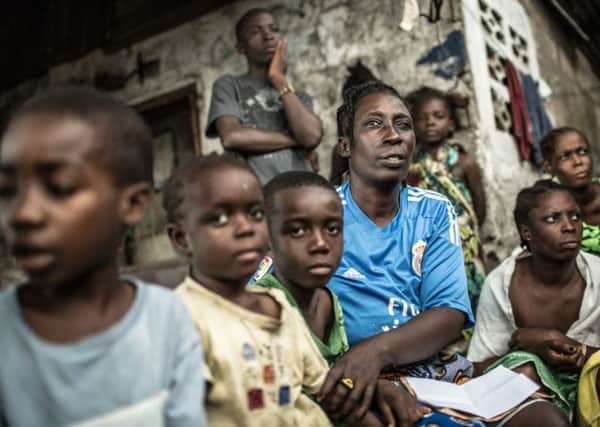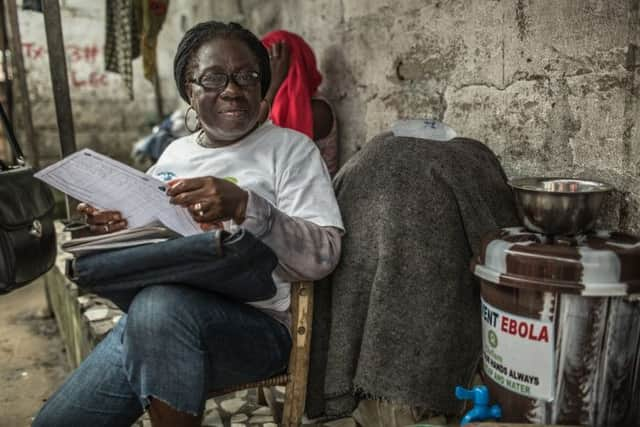Can the Ebola virus be stopped?


The back streets of Clara Town are an unlikely place for miracles to happen.
Yet in its warren of alleyways, just over the river from Liberia’s capital Monrovia, lives a woman Ebola couldn’t kill. Sitting outside her small house, surrounded by children playing in the dirt, Elena Nagbe is more numb than elated at cheating death.
Advertisement
Hide AdAdvertisement
Hide AdIt’s not surprising. She lost five of her family to the disease which swept through the district, killing most of those it touched. Elena’s father died first and those who are cared for him while he lay sick soon followed. Within a matter of weeks, she had also buried her mother, two sisters and a brother. Elena also fell ill and remembers little of what happened next.


“The house was put under quarantine, neighbours ran away and Elena was rushed to the Ebola treatment unit,” says Oxfam aid worker, Ian Bray, from Doncaster. “Just over two weeks later she was released with a certificate. It’s one which she is keen to show people. It’s understandable, because that piece of papers says she is cured.”
Liberia, along with Sierra Leone, has been one of the countries hardest hit by the Ebola outbreak. Since the first case was recorded in March, 13,268 people have been diagnosed with the disease - the equivalent of the entire population of a town the size of Ilkley. Of those, more than 5,000 have died.
“There is no effective vaccination or treatment for Ebola, so the only way you can stem its spread is by breaking the transmission cycle,” says Dr Geraldine O’Hara, a specialist in infectious diseases. Originally from Huddersfield, she now works at University College London and recently returned from a posting to Sierra Leone with Médecins Sans Frontières
Advertisement
Hide AdAdvertisement
Hide Ad“That in itself is not rocket science. Unlike an airborne virus like flu, Ebola is transmitted by bodily fluids, so in theory it is much easier to stem an outbreak. However, in the early stages of the crisis the World Health Organisation failed to put enough pressure on governments to act quickly. Without specialist treatment centres, those with Ebola ended up being admitted to existing hospitals and as a result many doctors and nurses became infected. In somewhere like Liberia, where there are only around 50 or 60 doctors to treat the entire nation, losing 10 per cent of them has had a devastating effect.”
Posted to Eastern Sierra Leone and a treatment centre near the border with Liberia and Guinea, Dr O’Hara spent almost a month on the frontline of the outbreak. When she returned to England, the official survival rate was just 45 per cent and most organisations working on the frontline admit the true picture may never be known.
“Of course it’s difficult to go into work each day knowing that more than half the patients you see are not going to survive, particularly when many of them are children,” she says. “If this outbreak had happened in the West we simply wouldn’t have allowed that many youngsters to die. We wouldn’t have sat back, we would have demanded intervention.”
Leading Yorkshire specialist Prof John Wright will begin work in Sierra Leone next week as part of the first wave of NHS clinicians who have volunteered to combat the crisis. The head of the pioneering Born in Bradford project, he is a veteran of medical practice in Africa and over the last quarter of a century he has dealt with epidemics of cholera, tuberculosis and HIV. However, he admits to some trepidation about his role as programme director at a new health centre in Moyamba, about six hours’ drive from Freetown.
Advertisement
Hide AdAdvertisement
Hide Ad“When the Ebola epidemic started I watched the news like everybody else but a month ago it became clear this was the biggest public health crisis in modern history. I was a bit nervous when I first got the call to go and my family have been too,” he says. “I understand the risks. A lot of it is around the risk of individual infection which is why there has been so much training around taking good care when I’m out there. There is a huge need and I want to make a contribution as much as I can.”
Along with 30 doctors and nurses, Prof Wright recently underwent training at the Army Medical Services Training Centre in York, but once he arrives in Sierra Leone he will have just three weeks to prepare before the centre receives its first patients in the middle of December. He will then both organise the local team and treat patients and while he expects to fly back home some point after Christmas, he will return regularly during 2015 for to deal with the unfolding crisis.
“Local health services have all collapsed really and they are in desperate need of medical help,” he says. “Work will include effective isolation of the sick so they do not infect others but inevitably in circumstances where treatment options and facilities are limited, care is likely to be restricted to being as supportive as possible of those infected.”
Back in Liberia, at West Point, one of the capital’s poorest slums, a number of locals have been recruited by Oxfam and trained as community health volunteers. Agnes, a 42 year old, mother-of-five, is one of them, visiting 20 homes a day, six-days-a-week offering advice on Ebola prevention.
Advertisement
Hide AdAdvertisement
Hide Ad“Agnes’s spirit is one that is key in the fight against Ebola,” says Ian. “Explaining what this disease is to families in West Point is far from easy, but her efforts seem to be working. Hand washing buckets dot the streets of West Point, people use them regularly and Agnes is sure to remind them on her daily rounds.”
It’s some weeks since the Liberian government ordered West Point to be closed down. As the disease tore through the slums, 80,000 people were quarantined inside and food quickly began to run out. At the time, many wondered whether there would ever be an end to the outbreak and having watched entire families wiped out by Ebola in many of the poorest areas, little optimism remained.
“The increase in Ebola cases seems to be slowing in Liberia, but whether this is a statistical blip is still unclear,” says Ian. “What is clear is that in West Point not enough help is coming in. After meeting Agnes I left feeling that may be we were seeing the beginning of the end of Ebola, but as we were heading back towards Monrovia a posse of ambulances passed in front of us. ‘Dead bodies’ my Liberian colleagues informed me.”
It’s a sight which is familiar to Elena and her younger brother Joe, who always carries with him a well-thumbed Bible. Inside he keeps his father’s Calvary Baptist Church card, the voting card which belonged to his mother and his brother’s social security card. In a society where most own few material possessions, they are a reminder of what he has lost, the Bible a reminder that when it comes to Ebola not even the most heartfelt prayers are always answered.